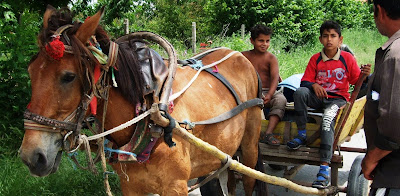A Brief Newsround - Week Ending 13/06/21
Why is it common in Western European countries for girls to go through a stage of being passionate about horses, yet here in Eastern Europe it's more common for boys to start handling horses when small?
In common with many girls in the U.K., I was sent to riding lessons at around 8 years old. It was fashionable for middle class parents to occupy their girls in this way on Saturday mornings. My sister was brilliant. She loved the lessons and was fearless. I was a sack of potatoes and frankly terrified. How I tried to overcome my fear of horses is partly described in the book I wrote after Castaway, Runaway. But the real change happened years later here in Bulgaria, when horses in need of rescue came into my life and the Lucy Irvine Foundation Europe was formed.
My former fears have in fact helped me comprehend how it's possible for some people in Bulgaria to treat horses the way they do. They cant "read" them, can't understand the way horses communicate subtly with their eyes, ears and entire bodies. They don't understand that each horse has a unique character, fears, dislikes and preferences . They don't 'get' them. I didn't 'get' them either before I became part of our mini herd of rescued horses, helped by a son who's an anthropologist to learn my role as lead mare.
Why girls aren't more involved with horses here is partly cultural, of course. When still tiny, Roma girl children follow their mothers about copying the way they sweep rough yards outside hovels with hand made twig brooms. They're trained towards their future roles as teenaged brides from early on. Boys, on the other hand sit on their father's knee, his arm around their middle while he drives a horse and cart with one hand. I've seen toddlers holding the reins and wielding sticks as whips .
When a foal is born, I've witnessed both boys and girls show wonder but that awe in the miracle of birth is soon replaced by pride in domination of the colt or filly. Joy in personal power replaces protective feelings towards a newborn as soon as it starts to struggle. The future of the foal is all about restraint and coercion and later, use to help the owner earn.
Why, given that a foal in his community is born to serve as transport and hauling help only, would a gypsy need to be able to read the language of horses? All he needs is to know it must be beaten in the face if it bites and whipped if it lifts a leg to kick. He doesn't need to know why it does those things. Yet if he did, and learned early on how to recognise signs of fear aggression, he might end up with a horse that doesn't bite or kick and who wants to work well.
They say that Bulgarian is one of the most difficult languages to learn. To those who have no natural feeling for the subject, learning the language of horses can be almost impossible, too. Yet it can and does happen that people, given guidance, can change the way they see horses and the difficulty won't stop the Lucy Irvine Foundation Europe teaching what we ourselves have learned. And we never stop learning. LIFE would particularly like to encourage more Roma girls to engage more with their family's work horse and to use their naturally caring feminine side when handling foals.
 |
| One of LIFE's valued helpers, Sonia, tenderly feeding a foal |
Before continuing, I want to make it clear that there are exceptions to the rule of harsh treatment by males of horses in the Roma enclaves where we work, young men who have more of an understanding of their horse than others. But they are the exceptions.
Great news on LIFE's rehoming front this past week includes more dogs chosen by kind people in the U.K. to share their lives. Unwanted puppies have been reserved, too, meaning that they'll never experience the sort of mistreatment older rescue cases here have been through. The puppies will come straight from their mother to LIFE, where they'll stay until they're fully vaccinated and old enough to travel to the loving homes waiting for them. Happily, the owner of the mother dog in the current case has agreed to have her spayed once she's stopped feeding her babies.
More great dog news is that we've secured the last of German Shepherd dog Marta's pups to rehome. Read more about him next week and how gorgeous Golden Boy and Charlie and Lisa are getting on - the three dogs found by friends abandoned after being tied into sacks.
Gray cats rule in cat news this week, with magnificent Winston basking under admiring eyes and tiny Elsa winning her fight against eye problems. And no mention of LIFE's gray cats would be complete without inclusion of sensational Smokey, one of LIFE's most eccentric.and delightful rescued kittens, now grown up and living the life of Riley in London.
 |
| From L - R Clockwise - Winston, Smokey and little Elsa |
Those following our daily activities will know that LIFE is facing outstanding vet bills. Any help at all to reduce those bills would be much appreciated so that we can take more cats and dogs in, without delaying their treatment, or if you're interested in adopting one of our rescued dogs please see our Facebook Page.
Thank you,
Lucy













Comments
Post a Comment